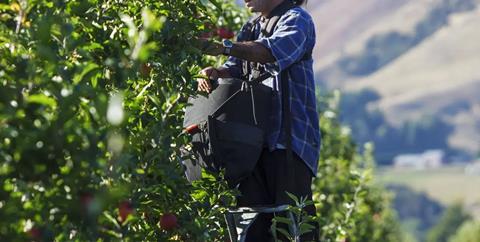New Zealand Apples and Pears says updates to the policy will ease pressures on growers
The New Zealand government has made changes to the Recognised Seasonal Employer (RSE) Scheme in a bid to support the country’s horticulture and viticulture industries.

The changes, which were announced by immigration minister Erica Stanford include increasing the cap on the number of workers by 1,250 to 20,750 for the 2024/25 season, lifting the pause on accommodation cost increases and making the requirement to pay RSE workers 10 per cent above the minimum wage only apply to experienced workers. Employers will also be able to average out RSE workers’ minimum 30 hours per week over a four-week period.
“We are making changes that can be delivered quickly, reduce costs and compliance for employers, and improve flexibility for RSE workers,” Stanford said.
“Our government is committed to increasing the number of RSE workers over time in line with industry demand, while balancing the availability of New Zealanders and accommodation for workers.”
Foreign affairs minister Winston Peters said the RSE scheme was central to New Zealand’s relationships in the Pacific and has delivered benefits to everyone involved.
“New Zealand is committed to supporting Pacific priorities,” he said. “That is why these changes include broader opportunities for skills development, greater flexibility in visa settings, and pay based on experience.”
New Zealand Apples and Pears (NZAPI) chief executive Karen Morrish has welcomed the policy changes ahead of the new season and said the changes will go a long way to easing pressures on apple and pear growers.
“As Aotearoa’s largest employer of permanent and seasonal RSE workforce, we have deep roots in the scheme and are significantly invested in ensuring it works for us and our Pacific nations,” she said.
“Our growers have faced incredible cost pressures in recent years and yesterday’s policy changes strike a balance that serves both our local industry and the Pacific communities we work with. It will have a considerable impact on the continued viability of the scheme.
“What’s more, they have come in time for new season harvest employment contracts, which will be a great relief to our growers across the country. We are incredibly grateful to our government and minister Stanford for listening to growers and making the changes needed in a timely manner.”
In 2022, 11,000 seasonal workers were employed at the peak of the apple and pear harvest in picking and packing roles, and, according to Morrish, their presence supported and sustained more than 3,600 permanent employees within the industry.
“RSE workers send home more than NZ$116m in earnings a year. This income has built homes, sent children to school, covered lifesaving medical treatments, enabled villages to access fresh water, and fed into local Pacific economies,” Morrish said.
“The RSE scheme is hugely valuable to these Pacific families and communities as well, and we are really pleased to see increased flexibility for our RSE workers, who will now have the ability to go home for family emergencies and move across regions or employers if required.”



